新概念英语第一册L101~L120短语总结(结合初中课本)
- 格式:doc
- 大小:34.00 KB
- 文档页数:5
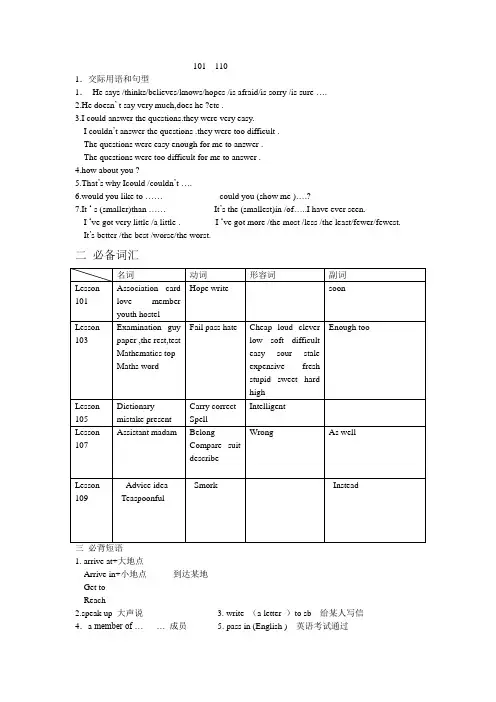
101---1101.交际用语和句型1.He says /thinks/believes/knows/hopes /is afraid/is sorry /is sure ….2.He doesn’ t say very much,does he ?etc .3.I could answer the questions.they were very easy.I couldn’t answer the questions .they were too difficult .The questions were easy enough for me to answer .The questions were too difficult for me to answer .4.how about you ?5.That’s why Icould /couldn’t ….6.would you like to ……could you (show me )….?7.It ‘ s (smaller)than ……It’s the (smallest)in /of…..I have ever seen.I ‘ve got very little /a little . I ‘ve got more /the most /less /the least/fewer/fewest. It’s better /the best /worse/the worst.二必备词汇1. arrive at+大地点Arrive in+小地点到达某地Get toReach2.speak up 大声说3. write (a letter )to sb 给某人写信4.a member of ……成员 5. pass in (English ) 英语考试通过6.cheer up 使变得高兴7. next to sb 紧挨着某人8.at the top of …. 在…的顶部8. here is a sth for sb 这有给某人的东西9.want to do sth 想做某事want sb to do sth 希望某人做某事10.be in fashion 时髦流行11. advice 不可数a piece of advice12. a good idea 好主意have no idea 不知道四语法重点1.直接引语和间接引语直接引语就是直接引用说话人原来所受的话;间接引语就是原话的转述。
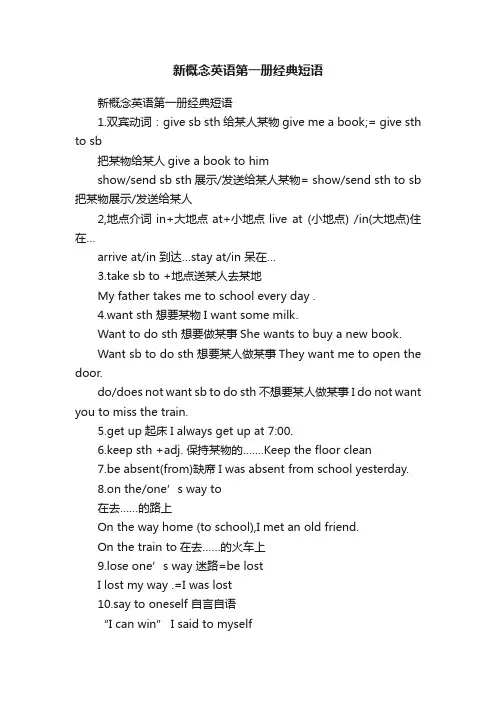
新概念英语第一册经典短语新概念英语第一册经典短语1.双宾动词:give sb sth给某人某物give me a book;= give sth to sb把某物给某人give a book to himshow/send sb sth展示/发送给某人某物= show/send sth to sb 把某物展示/发送给某人2,地点介词in+大地点at+小地点live at (小地点) /in(大地点)住在…arrive at/in 到达…stay at/in 呆在…3.take sb to +地点送某人去某地My father takes me to school every day .4.want sth 想要某物I want some milk.Want to do sth 想要做某事She wants to buy a new book.Want sb to do sth 想要某人做某事They want me to open the door.do/does not want sb to do sth 不想要某人做某事I do not want you to miss the train.5.get up起床I always get up at 7:00.6.keep sth +adj. 保持某物的…….Keep the floor clean7.be absent(from)缺席I was absent from school yesterday.8.on the/one’s way to在去……的路上On the way home (to school),I met an old friend.On the train to在去……的火车上9.lose one’s way 迷路=be lostI lost my way .=I was lost10.say to oneself 自言自语“I can win” I said to myself11.put sth into 把……放到……I put some money into my pocket .I put some books into my bag .12. take out取出He took out a note book and wrote them down ,13. put on your coat穿上take off your shoes脱掉turn on 打开turn off 关掉put your coat on take your shoes offput it on take them off (名词可后可中间,代词只能放中间)14. be afraid of sth 害怕I am afraid of dog .be afraid (that)+宾从恐怕……I am afraid that it will rain tomorrow .I’m afraid that I can’t do it .15.buy sth for sb 为某人买某物I bought a present for you .buy sth from sb 从某人那买某物She bought a tie from Tony .16.hundreds of 数以百计thousands of 数以千计.17.Be in fashion 时髦Jeans are always in fashion.Be out of fashion 过时Skirts are out of fashion this year .18.till (until )直到I can arrive till(until)3:00 this afternoom.Not ……until直到..才I did n’t finish my homework until 10:00 in the evening .19.许多a lot of water(不可数)oranges (可数)many apples (可数)much meat (不可数)plenty of time(不可数)/tomatoes(可数)20.not ……at all 根本不I do n’t know her at all .I do n’t want to talk with him at all .21.have breakfast/lunch/supper/dinner /a meal /a swim/ abath /a lesson/a holiday/a good time .have可替换其他词,表达意思。
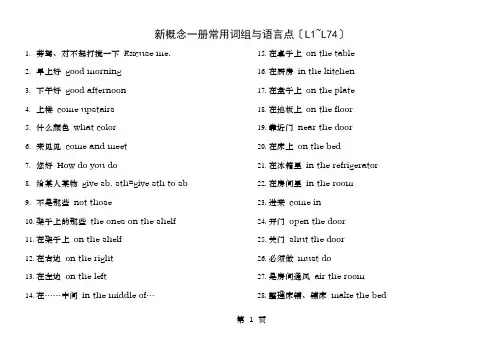
新概念一册常用词组与语言点〔L1~L74〕1.劳驾、对不起打搅一下Excuse me.2.早上好good morning3.下午好good afternoon4.上楼come upstairs5.什么颜色what color6.来见见come and meet7.您好How do you do8.给某人某物give sb. sth=give sth to sb9.不是那些not those10.架子上的那些the ones on the shelf11.在架子上on the shelf12.在右边on the right13.在左边on the left14.在……中间in the middle of…15.在桌子上on the table16.在厨房in the kitchen17.在盘子上on the plate18.在地板上on the floor19.靠近门near the door20.在床上on the bed21.在冰箱里in the refrigerator22.在房间里in the room23.进来come in24.开门open the door25.关门shut the door26.必须做must do27.是房间通风air the room28.整理床铺、铺床make the bed第1 页29.梳妆台dressing table30.翻开〔电视机、电灯、收音机等〕turn on31.关〔电视机、电灯、收音机等〕turn off32.脱掉take off33.穿上put on34.追逐run after35.在河面上on the river36.在花园里in the garden37.在树底下under the tree38.…怎么样?What about …= How about…?39.做…怎么样?What about=How about=Would youlike=Do you want…40.爬树climb the tree41.请你再说一遍pardon=I beg your pardon=pardon me42.好天气、晴天a fine day 43.与家人在一起be with families44.从…上空飞过fly over45.看…look at46.在天上in the sky47.桥底下under the bridge48.做作业do one’s homework49.掉下、跳离jump off50.想要做某事want to do51.做饭cook a meal52.等待wait for53.吃饭have a meal54.照顾look after=take care of55.洗盘子、刷盘子wash the dishes56.…的一张照片a photograph of…57.在山谷中in the valley第2 页58.靠近小河on the river59.沿着…走walk along60.在水中in the water61.横渡swim across62.在公园旁边beside the park63.走出… walk out of64.走进…里go into65.做一个书架/书橱make a bookcase66.给你here you are67.打算做某事be going to do68.为…〔准备的〕be for sb69.最喜欢的颜色favourite colour70.等待… wait for71.刮脸shave one’s face72.听….listen to73.处理… do with=deal with74.穿上… put on75.脱掉take off76.把…放在…上put…on77.在…前面〔外部〕in front of78.在…前部〔内部〕in the front of79.小心be careful80.在架子上on the shelf81.一个得意的花瓶a lovely vase82.给某人展示… show sb sth= show sth to sb83.带给某人某物take sb sth= take sth to sb84.送给某人某物send sb sth= send sth to sb85.一块乳酪a piece of cheese86.一块面包a loaf of bread87.一块肥皂a bar of soap第3 页88.一块巧克力a bar of chocolate89.一瓶牛奶a bottle of mike90.一英镑的糖a pound of sugar91.半磅咖啡half a pound of coffee92.四分之一磅茶a quarter of a pound of tea93.一听烟丝a tin of tobacco94.当然certainly= of course95.沏茶make the tea96.在水壶中in the cupboard97.在那边over there98.在茶壶后面behind the teapot99.我能…但我不能… I can…but I can’t…100.在茶壶里in the teapot101.寻找look for102.快点hurry up103.到这来come here104.一会儿in a minute105.隔壁next door106.在某人的办公室in one’s office107.要求某人做某事ask sb. o do sth.108.为某人打信type a letter for sb.109.怎么了?What’s wrong=What’s the matter=Is there something wrong with you110.一百、两百、三百one /two /three hundred111.数以百计的hundreds of112.数以千计的thousands of113.举起椅子lift the chair114.读书read the book115.读杂志read the magazine116.做蛋糕make a cake\make cakes第4 页117.做饼干make biscuits118.喜欢做某事〔偶尔〕like to do119.喜欢做某事〔经常〕like doing120.清咖啡black coffee121.想要做某事want to do sth.122.想要某人〔不〕做某事want sb. (not) to do sth. 123.一磅肉馅a pound of mince124.告诉实情tell the truth125.告诉某人〔不〕做某事tell sb (not) to do sth. 126.来自于come from= be from127.…的样子?/…怎么样?〔通常用来询问某人的外貌特征或用来询问天气〕what’s ….like128.在春天、夏天、秋天、冬天in spring/summer/autumn/winter129.哪国人what nationality 130.在东部in the east131.谈论的话题subject of conversation132.尽某人做大的努力做… try one’s best to do 133.与…谈话之中be in conversation with sb. 134.居住live in/at135.去上班go to work136.去学校go to school137.呆在家里stay at home138.在早上in the morning139.带某人去某地take sb to spl140.每天every day=each day141.吃午饭eat lunch142.吃早饭eat breakfast143.吃晚饭eat supper/dinner144.在中午at noon第5 页145.在下午in the afternoon146.会见朋友meet some friends=see some friends 147.一起喝茶drink tea together148.在晚上at night149.回家come home=go home150.到家get home = arrive home151.在家be home152.上床睡觉go to bed153.乘小汽车/公共汽车/火车等by car/bus/train=take a car/bus/train154.步行、走路on foot= walk to…155.骑自行车by bike=ride a bike156.去购物go shopping= go to the shops157.在客厅in the living room158.在花园里in the garden 159.此时此刻at the moment=now160.一本有趣的书an interesting book161.做饭cook a meal162.大尺寸的the large size163.小尺寸的the small size164.一瓶胶水a bottle of glue165.就这些吗Is that all166.一盒粉笔a box of chalk167.其他的东西something else168.给…打call sb169.医生的号码the doctor’s telephone number 170.患感冒have a cold171.患头痛have a headache172.患耳痛have an earache173.患牙痛have a toothache第6 页174.患胃痛have a stomach ache175.患流行性感冒/麻疹/腮腺炎have flu/ measles/mumps176.吃一片/一些阿司匹林have an/some aspirin/s 177.吃一些药片have some medicine178.看医生see a doctor179.看牙医see a dentist180.发烧have a temperature181.上楼go upstairs182.起床get up183.患重感冒have a bad cold184.油腻的食物rich food185.拿…玩/与…玩play with186.谈论… talk about187.在图书馆in the library 188.身体探出lean out of189.弄出噪音、发出声响make a noise190.…的钥匙/…的答案the key to…191.十八岁eighteen years old=eighteen-year-old 192.没关系、不用谢that’s all right=not at all=you’re welcome193.玩的愉快!Have a good time=Enjoy oneself 194.单独… by oneself195.快乐做某事enjoy doing sth.196.在肉店at the butcher’s197.在蔬菜店at the greengrocer’s198.在理发店at the hairdresser’s199.在食杂店at the grocer’s200.缺席… be absent from201.上周last week第7 页202.花费…做…. spend….(in) doing203.在我妈妈家stay at my mother’s204.在乡下in the country205.做礼拜at church206.在乳品店at the dairy207.在面包店at the baker’s208.参观比赛at the race209.参加比赛in the race210.在人群中in the crowd211.在回家的路上on one’s way home212.在某人去往某地的路上on one’s way to…213.在去往…的路上on the way to….214.在文具店at the stationer’s215.三次three times216.接answer the telephone217.我是…〔用于〕this is …218.最后at last= in the end219.今晚tonight220.昨晚last night221.前天早上/下午/晚上the day before yesterday in the morning/afternoon/evening222.前天夜里the night before last223.去某地go to spl224.迷路lose one’s way225.在公共汽车站附近near the bus stop226.心中暗想say to oneself227.去往…的路怎么走?〔问路〕Can you tell me the way to…228.把…放在…里put …into229.把…从…取出/拿出take …out第8 页230.伤到某人自己hurt oneself231.向某人问好/问候某人greet oneself232.在街上in the street233.前天the day before yesterday234.努力工作work harda第9 页。
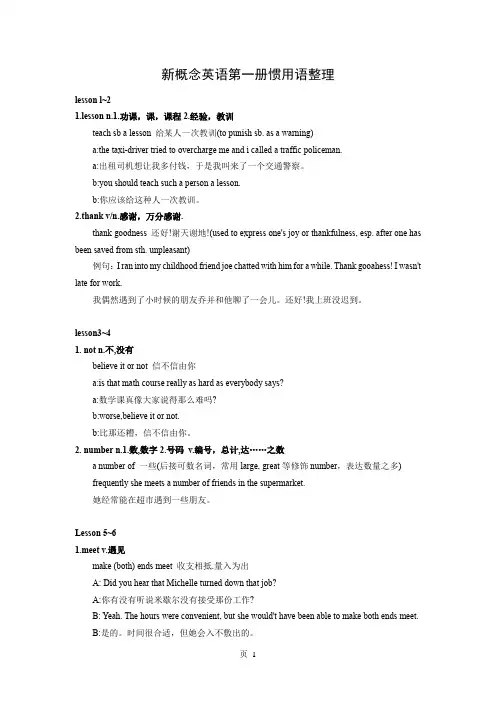
新概念英语第一册惯用语整理lesson l~21.lesson n.1.功课,课,课程2.经验,教训teach sb a lesson 给某人一次教训(to punish sb. as a warning)a:the taxi-driver tried to overcharge me and i called a traffic policeman.a:出租司机想让我多付钱,于是我叫来了一个交通警察。
b:you should teach such a person a lesson.b:你应该给这种人一次教训。
2.thank v/n.感谢,万分感谢.thank goodness 还好!谢天谢地!(used to express one's joy or thankfulness, esp. after one has been saved from sth. unpleasant)例句:I ran into my childhood friend joe chatted with him for a while. Thank gooahess! I wasn't late for work.我偶然遇到了小时候的朋友乔并和他聊了一会儿。
还好!我上班没迟到。
lesson3~41. not n.不,没有believe it or not 信不信由你a:is that math course really as hard as everybody says?a:数学课真像大家说得那么难吗?b:worse,believe it or not.b:比那还糟,信不信由你。
2. number n.1.数,数字2.号码v.编号,总计,达……之数a number of 一些(后接可数名词,常用large,great等修饰number,表达数量之多)frequently she meets a number of friends in the supermarket.她经常能在超市遇到一些朋友。
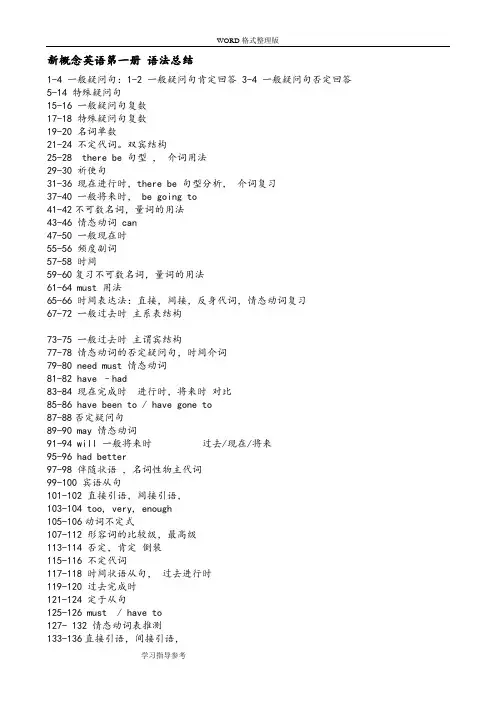
新概念英语第一册语法总结1-4 一般疑问句:1-2 一般疑问句肯定回答 3-4 一般疑问句否定回答5-14 特殊疑问句15-16 一般疑问句复数17-18 特殊疑问句复数19-20 名词单数21-24 不定代词。
双宾结构25-28 there be 句型,介词用法29-30 祈使句31-36 现在进行时,there be 句型分析,介词复习37-40 一般将来时, be going to41-42不可数名词,量词的用法43-46 情态动词 can47-50 一般现在时55-56 频度副词57-58 时间59-60复习不可数名词,量词的用法61-64 must 用法65-66 时间表达法:直接,间接,反身代词,情态动词复习67-72 一般过去时主系表结构73-75 一般过去时主谓宾结构77-78 情态动词的否定疑问句,时间介词79-80 need must 情态动词81-82 have –had83-84 现在完成时进行时,将来时对比85-86 have been to / have gone to87-88否定疑问句89-90 may 情态动词91-94 will 一般将来时过去/现在/将来95-96 had better97-98 伴随状语,名词性物主代词99-100 宾语从句101-102 直接引语,间接引语,103-104 too, very, enough105-106动词不定式107-112 形容词的比较级,最高级113-114 否定,肯定倒装115-116 不定代词117-118 时间状语从句,过去进行时119-120 过去完成时121-124 定于从句125-126 must / have to127- 132 情态动词表推测133-136直接引语,间接引语,137-138 条件状语从句139-140宾语从句141-144 被动语态Lesson 1 Excuse me1. Words1) excuse (1)重音(2)与sorry 的区别(3)Excuse 用的不同场景a. 请别人让路b. 引起别人的注意c. 打断别人的谈话d. 可以当n. 借口 eg. No excuse. 别找借口,没有借口。
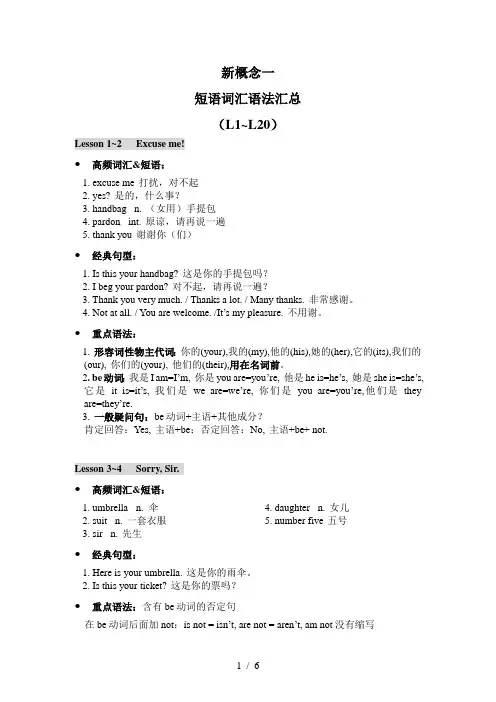
新概念一短语词汇语法汇总(L1~L20)Lesson 1~2 Excuse me!●高频词汇&短语:1. excuse me 打扰,对不起2. yes? 是的,什么事?3. handbag n. (女用)手提包4. pardon int. 原谅,请再说一遍5. thank you 谢谢你(们)●经典句型:1. Is this your handbag? 这是你的手提包吗?2. I beg your pardon? 对不起,请再说一遍?3. Thank you very much. / Thanks a lot. / Many thanks. 非常感谢。
4. Not at all. / You are welcome. /It’s my pleasure. 不用谢。
●重点语法:1. 形容词性物主代词:你的(your),我的(my),他的(his),她的(her),它的(its),我们的(our), 你们的(your), 他们的(their),用在名词前。
2. be动词:我是I am=I’m, 你是you are=you’re, 他是he is=he’s, 她是she is=she’s, 它是it is=it’s, 我们是we are=we’re, 你们是you are=you’re,他们是they are=they’re.3. 一般疑问句:be动词+主语+其他成分?肯定回答:Yes, 主语+be;否定回答:No, 主语+be+ not.Lesson 3~4 Sorry, Sir.●高频词汇&短语:1. umbrella n.伞2. suit n. 一套衣服3. sir n. 先生4. daughter n. 女儿5. number five 五号●经典句型:1. Here is your umbrella. 这是你的雨伞。
2. Is this your ticket? 这是你的票吗?●重点语法:含有be动词的否定句在be动词后面加not:is not = isn’t, are not = aren’t, am not没有缩写●实用对话:1. --请把我的大衣和伞拿给我。
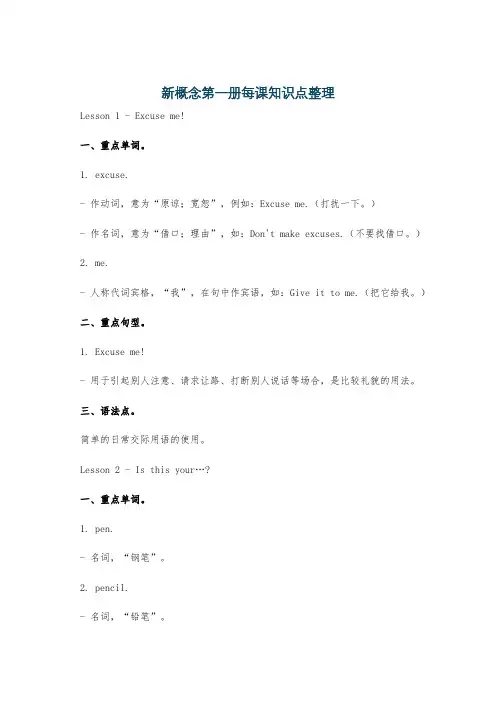
新概念第一册每课知识点整理Lesson 1 - Excuse me!一、重点单词。
1. excuse.- 作动词,意为“原谅;宽恕”,例如:Excuse me.(打扰一下。
)- 作名词,意为“借口;理由”,如:Don't make excuses.(不要找借口。
)2. me.- 人称代词宾格,“我”,在句中作宾语,如:Give it to me.(把它给我。
)二、重点句型。
1. Excuse me!- 用于引起别人注意、请求让路、打断别人说话等场合,是比较礼貌的用法。
三、语法点。
简单的日常交际用语的使用。
Lesson 2 - Is this your…?一、重点单词。
1. pen.- 名词,“钢笔”。
2. pencil.- 名词,“铅笔”。
3. book.- 名词,“书”。
4. watch.- 名词,“手表”;也可作动词,“观看”,如:watch TV(看电视)。
二、重点句型。
1. Is this your pen?- 这是一般疑问句,其结构为“be动词(is/are等)+主语+其他”,回答可以是“Yes, it is.”或者“No, it isn't.”三、语法点。
1. 一般疑问句的构成与回答。
2. 指示代词this的用法,用来指代离说话者较近的人或物。
Lesson 3 - Sorry, sir.一、重点单词。
1. umbrella.- 名词,“雨伞”。
2. please.- 副词,用于请求别人做某事时表示礼貌,如:Please open the window.(请打开窗户。
)二、重点句型。
1. Is this your umbrella?- 同Lesson 2中的一般疑问句结构。
2. Sorry, sir.- “sorry”表示歉意,“sir”是对男性的尊称。
三、语法点。
1. 继续巩固一般疑问句。
2. 尊称“sir”的用法。
Lesson 4 - Is this your…?一、重点单词。
![全]新概念英语第一册全册短语归纳大全](https://uimg.taocdn.com/28806c1a0166f5335a8102d276a20029bd6463dc.webp)
全]新概念英语第一册全册短语归纳大全New Concept English Unit 1-2: Common Phrases1.Excuse me - Sorry。
can I interrupt?2.I beg your pardon - Could you please repeat that?3.Thank you - Thanks.4.Thank you very much - Many thanks。
thanks a lot。
thanks very much.5.You're e - No need to thank me。
it's okay。
not at all。
it was nothing.6.It's a pleasure - I'm happy to help。
my pleasure.7.I'm sorry - Apologies.8.Good morning - Hello in the morning.9.This is + name - Let me XXX.10.Nice to meet you - Pleased to meet you。
glad to meet you.11.How do you do。
- Hello。
how are you?12.What make。
- What brand?13.A new student - A new student.14.XXX。
- What is your nality?15.What's your job。
- What do you do for a living?16.A keyboard operator - A computer operator.17.An engineer - XXX.18.How are you。
- How are you doing?19.I'm fine - I'm good。
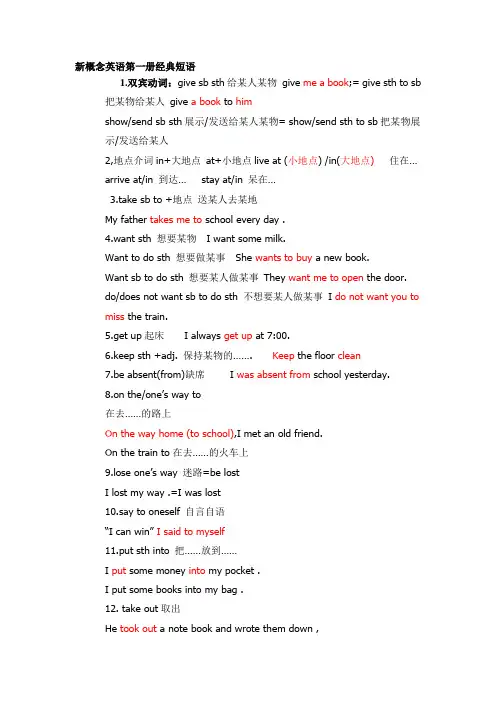
新概念英语第一册经典短语1.双宾动词:give sb sth给某人某物give me a book;= give sth to sb把某物给某人give a book to himshow/send sb sth展示/发送给某人某物= show/send sth to sb把某物展示/发送给某人2,地点介词in+大地点at+小地点live at (小地点) /in(大地点)住在…arrive at/in 到达…stay at/in 呆在…3.take sb to +地点送某人去某地My father takes me to school every day .4.want sth 想要某物I want some milk.Want to do sth 想要做某事She wants to buy a new book.Want sb to do sth 想要某人做某事They want me to open the door.do/does not want sb to do sth 不想要某人做某事I do not want you to miss the train.5.get up起床I always get up at 7:00.6.keep sth +adj. 保持某物的…….Keep the floor clean7.be absent(from)缺席I was absent from school yesterday.8.on the/one’s way to在去……的路上On the way home (to school),I met an old friend.On the train to在去……的火车上9.lose one’s way 迷路=be lostI lost my way .=I was lost10.say to oneself 自言自语“I can win” I said to myself11.put sth into 把……放到……I put some money into my pocket .I put some books into my bag .12. take out取出He took out a note book and wrote them down ,13. put on your coat穿上take off your shoes脱掉turn on 打开turn off 关掉put your coat on take your shoes offput it on take them off (名词可后可中间,代词只能放中间)14. be afraid of sth 害怕I am afraid of dog .be afraid (that)+宾从恐怕……I am afraid that it will rain tomorrow .I’m afraid that I can’t do it .15.buy sth for sb 为某人买某物I bought a present for you .buy sth from sb 从某人那买某物She bought a tie from Tony . 16.hundreds of 数以百计thousands of 数以千计.17.Be in fashion 时髦Jeans are always in fashion.Be out of fashion 过时Skirts are out of fashion this year .18.till (until )直到I can arrive till(until)3:00 this afternoom.Not ……until直到..才I did n’t finish my homework until 10:00 in the evening .19.许多a lot of water(不可数)oranges (可数)many apples (可数)much meat (不可数)plenty of time(不可数)/tomatoes(可数)20.not ……at all 根本不I do n’t know her at all .I do n’t want to talk with him at all .21.have breakfast/lunch/supper/dinner /a meal /a swim/ a bath /a lesson/a holiday/a good time .have可替换其他词,表达意思。

新概念英语第一册语法总结1-4 一般疑问句:1-2 一般疑问句肯定回答 3-4 一般疑问句否定回答5-14 特殊疑问句15-16 一般疑问句复数17-18 特殊疑问句复数19-20 名词单数21-24 不定代词。
双宾结构25-28 there be 句型,介词用法29-30 祈使句31-36 现在进行时,there be 句型分析,介词复习37-40 一般将来时, be going to41-42不可数名词,量词的用法43-46 情态动词 can47-50 一般现在时55-56 频度副词57-58 时间59-60复习不可数名词,量词的用法61-64 must 用法65-66 时间表达法:直接,间接,反身代词,情态动词复习67-72 一般过去时主系表结构73-75 一般过去时主谓宾结构77-78 情态动词的否定疑问句,时间介词79-80 need must 情态动词81-82 have –had83-84 现在完成时进行时,将来时对比85-86 have been to / have gone to87-88否定疑问句89-90 may 情态动词91-94 will 一般将来时过去/现在/将来95-96 had better97-98 伴随状语,名词性物主代词99-100 宾语从句101-102 直接引语,间接引语,103-104 too, very, enough105-106动词不定式107-112 形容词的比较级,最高级113-114 否定,肯定倒装115-116 不定代词117-118 时间状语从句,过去进行时119-120 过去完成时121-124 定于从句125-126 must / have to127- 132 情态动词表推测133-136直接引语,间接引语,137-138 条件状语从句139-140宾语从句141-144 被动语态Lesson 1 Excuse me1. Words1) excuse (1)重音(2)与sorry 的区别(3)Excuse 用的不同场景a. 请别人让路b. 引起别人的注意c. 打断别人的谈话d. 可以当n. 借口 eg. No excuse. 别找借口,没有借口。
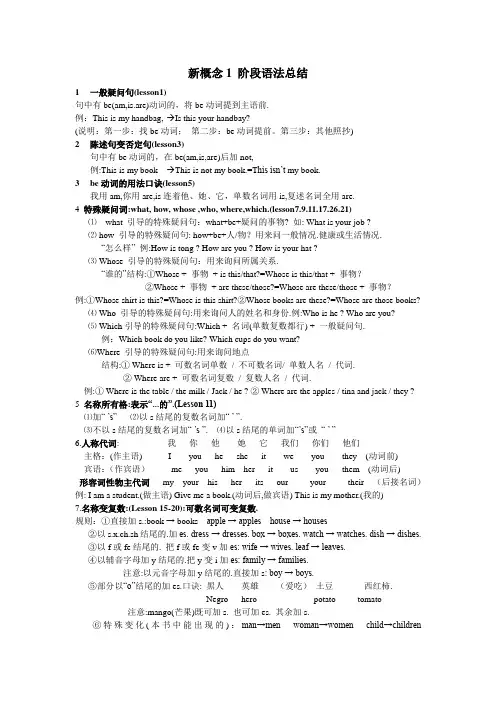
新概念1 阶段语法总结1一般疑问句(lesson1)句中有be(am,is.are)动词的,将be动词提到主语前.例:This is my handbag,-→Is this your handbay?(说明:第一步:找be动词;第二步:be动词提前。
第三步:其他照抄)2陈述句变否定句(lesson3)句中有be动词的,在be(am,is,are)后加not,例:This is my book---→This is not my book.=T his isn’t my book.3be动词的用法口诀(lesson5)我用am,你用are,is连着他、她、它,单数名词用is,复述名词全用are.4 特殊疑问词:what, how, whose ,who, where,which.(lesson7.9.11.17.26.21)⑴what 引导的特殊疑问句:what+be+疑问的事物? 如: What is your job ?⑵ how 引导的特殊疑问句: how+be+人/物?用来问一般情况.健康或生活情况.“怎么样” 例:How is tong ? How are you ? How is your hat ?⑶ Whose 引导的特殊疑问句:用来询问所属关系.“谁的”结构:①Whose + 事物+ is this/that?=Whose is this/that + 事物?②Whose + 事物+ are these/those?=Whose are these/those + 事物?例:①Whose shirt is this?=Whose is this shirt?②Whose books are these?=Whose are those books?⑷ Who 引导的特殊疑问句:用来询问人的姓名和身份.例:Who is he ? Who are you?⑸ Which引导的特殊疑问句:Which + 名词(单数复数都行) + 一般疑问句.例:Which book do you like? Which cups do you want?⑹Where 引导的特殊疑问句:用来询问地点结构:① Where is + 可数名词单数/ 不可数名词/ 单数人名/ 代词.② Where are + 可数名词复数/ 复数人名/ 代词.例:① Where is the table / the milk / Jack / he ? ② Where are the apples / tina and jack / they ?5 名称所有格:表示“...的”.(Lesson 11)⑴加“ ’s”⑵以s结尾的复数名词加“ ’”.⑶不以s结尾的复数名词加“ ’s ”.⑷以s结尾的单词加“’s”或“ ’”6.人称代词: 我你他她它我们你们他们主格:(作主语) I you he she it we you they (动词前)宾语:(作宾语)me you him her it us you them (动词后)形容词性物主代词my your his her its our your their (后接名词)例: I am a student.(做主语) Give me a book.(动词后,做宾语) This is my mother.(我的)7.名称变复数:(Lesson 15-20):可数名词可变复数.规则:①直接加s.:book → books apple → apples house → houses②以s.x.ch.sh结尾的.加es. dress → dresses. box → boxes. watch → watches. dish → dishes.③以f或fe结尾的. 把f或fe变v加es: wife → wives. leaf → leaves.④以辅音字母加y结尾的.把y变i加es: family → families.注意:以元音字母加y结尾的.直接加s: boy → boys.⑤部分以“o”结尾的加es.口诀: 黑人英雄(爱吃)土豆西红柿.Negro hero potato tomato注意:mango(芒果)既可加s. 也可加es. 其余加s.⑥特殊变化(本书中能出现的):man→men woman→women child→childrenmilkman→milkmen sheep→sheep f ish→fish.(fishes代词不同种类的鱼) tooth→teeth8.祈使句:(lesson 21.23.29):用来表示请求.建议.命令.叮嘱.(通常省略主语you).结构:动词原形+名称/代词/介词. 例: Give me abook. Open the window. Shut the door.9.宾语:由名称、代词等来承担,放在动词后,即动作施加给谁,谁就是宾语.例: She often helps me .主语谓语动词宾语双宾语:(lesson21):有时动词可以有两个宾语.一个是直接宾语.一个是间接宾语.四字箴言:直物间人. 人在前时:Give me a book. 注:人称代词用宾格.物在前时:Give a book to me (中间加个to)10.there be 句型(lesson 25.27)区别: 人有某物用have 如:I have abook.(以后细讲)某处有某物. 用there be 句型。
新概念英语第一册短语归纳1-40课详解Lesson 1~ 2Excuse me. 对不起。
I beg your pardon. 请再说一遍。
thank you 感谢你(们)very much 非常地Thank you very much 非常感谢= Many thanks.= Thanks a lot.= Thanks very much.You’re welcome. 不必谢。
That’s all right. 没关系/ 不客气。
= That’s OK.= Not at all.It was nothing. 没什么。
It’s a pleasure. 我很乐意。
= My pleasure。
Lesson 3~ 4I’m sorry. 对不起.Lesson 5~ 6Good morning. 早上好.This is + 人名将某人介绍给他人Nice to meet you. 很高兴见到你。
Nice to meet you, too. 我也很高兴见到你。
Glad to meet you. 很高兴见到你。
Pleased to meet you. 很高兴见到你。
How do you do? 你好!what make 什么牌子an new student 一个新学生Lesson 7~ 8what nationality 什么国籍What’s your job? 你是做什么工作的?a keyboard operator 电脑操作人员an engineer 一个工程师Lesson 9~ 10 How are you? 你好吗?I’m fine. 我很好。
= I’m very well.How have you been? 你近况如何?How is everything going on? 一切都好吗? Just fine. 还好。
Just so so. 马马虎虎。
Not bad. 不坏。
Nice to see you. 见到你真高兴.Nice to see you, too. 见到你我也很高兴. look at …看……Lesson 11~ 12Whose shirt 谁的衬衫Here you are. 给你.Lesson 13~ 14what colour 什么颜色come upstairs 上楼go downstairs 下楼nice dress 漂亮的裙子lovely hat 可爱的帽子the same 同一的; 相同的Here they are. 给你(复数)Here it is. 给你(单数)Lesson 15~ 16customs officer 海关官员That’s fine. 好了。
新概念第一册短语总结上IMB standardization office【IMB 5AB- IMBK 08- IMB 2C】新概念第一册短语总结上(1-72课)Lesson 1 – 101.Excuse me打扰了2.This is your …这是你的…3.Is this your…这是你的...吗4.5.This is not my…这不是我的…6.What is this.这是什么7.8.Thank you very much非常感谢9.Here is my …这里是我的10.There那里11.Son and daughter儿子和女儿12.Umbrella and ticket伞/票13.Number five第五号14.Shirt and skirt衬衣/短裙15.Teacher and student教师/学生16.Good morning早上好17.In the morning在早上18.A new student一个新学生19.He is German他是德国人20.He is a German teacher他是一德国教师1.Mr. – Mrs. – Miss先生/夫人/小姐2.Nice to meet you见到你很高兴3.What make is it它是什么牌子的车1.What nationality are you你的国籍是什么2.3.You are…你是—4.You are not…你不是--5.Are you….你是—吗6.7.Yes, I am – No, I am not.是,我是/不,我不是1.What is your name你名字是什么1.My name is…= My name’s…我名字是---1.An engineer and an mechanic一名工程师/机械师1. A keyboard operator键盘操作人员2.Policeman and policewoman男警察/ 女警察1. A doctor and a nurse医生/护士2.Hair and hairdresser头发/理发师3.Air hostess空中小姐4. A taxi driver出租车司机5.Postman and milkman邮递员/送牛奶人1.How are you你身体好吗2.3.I am fine我很好4.How is Tom汤姆身体好吗5.6.He is well.他很好/形容词7.Day and today天/今天8.Look at me…看我。
新概念英语第一册1---144课语法点总结1.物主代词2.人称代词3.Be动词Be动词有am, is ,are ,过去式是was, were .根据主语的变化而变化。
4.一般疑问句定义:是指可以用yes 或者no 回答的句子。
肯定句变疑问句:肯定句中存在be动词,直接be动词提句首,结尾加问号。
若肯定句中存在情态动词,则情态动词提句首,后面加问号。
若肯定句中存在实意动词,则直接在句首加助动词do/does/did ,实意动词变原形,结尾加问号。
5.特殊疑问句定义:不能用yes或者no 回答的句子。
构成:特殊疑问词+一般疑问句特殊疑问词有:what (什么),when (何时),where (何地), who (谁), whom (谁宾格) ,whose (谁的), which (哪个),why(为什么) , how (怎么样).口诀:8w1h.6.不定冠词a/ an以a,e , i, o , 开头的单词前,表示一个的要用an .若单词以u开头的单词,视情况而定,发本身因时,前面加a.其他加an .若一个字母单独出现时,加an 的字母:a,e,i,o; x , r, s, l , n , f , m , h (学而思送来那份美好)7.形容词用法:形容词多放在名词或代词前面,对他们起修饰或限定作用。
通常用来说明人或事物的大小,颜色,形状或者特征等。
注意:当形容词单独出现时,前面不可加a/an. 如果一个名词前有多个形容词修饰,排字口诀:美小圆旧黄,法国木书房。
8.名词所有格。
构成:一般情况下,有生命的直接在名词后加’s. 无生命的用of 含义:名词所有格表示........的若名词变复数后词尾有s的,直接加‘即可。
9.名词复数的规则变化:一般情况加-s 清辅音后读/s/map-maps 浊辅音和元音后读/z/ bag-bags以s, sh, ch, x等结尾加-es 读/iz/ bus-buses/ watch-watches以辅音字母+y结尾变y 为i再加es 读/z/ baby---babies名词复数特殊形式1)以y结尾的专有名词,或元音字母+y 结尾的名词变复数时,直接加s变复数。
时态:大凡现在时,现在进行时,现在完成时,大凡过去时,过去进行时,过去完成时,大凡将来时,过去将来时。
词性:动词现在分词、动词的过去式和过去分词。
形容词、副词的比较级与最高级。
助动词、情态动词、半情态动词的使用。
动词不定式。
反身代词、不定代词。
分外疑问词。
句式:简单句、并列句、复合句(定语从句、状语从句、宾语从句)。
语态:被动语态。
结构:There be结构。
语序:倒装。
(新概念英语一册1-144课的所不变搭配短语)I beg your pardon请您在重复(说)一遍Nice to meet you(too)(我也)很高兴见到你Look at…看…How do you do你好Be careful小心A loaf of一个A bar of一条A bottle of一瓶A pound of一磅Half a pound of 半磅A quarter of四分之一A tin of一听Hurry up快点Next door隔壁Black coffee 不加牛奶的咖啡White coffee加牛奶的咖啡Come home from school放学回家Come home from work下班回家At the moment此刻What’s the time?几点钟?Come upstairs上楼Come downstairs下楼Hundreds of…数以百计的…On the way home在回家的途中This morning今天早晨This afternoon今天下午This evening今天晚上tonight今天夜里Yesterday morning昨天早晨Yesterday afternoon昨天下午Yesterday evening昨天晚上Last night昨天夜里The day before yesterday in the morning前天早晨The day before yesterday in the afternoon前天下午The day before yesterday in the evening前天晚上The night before last前天夜间A low mark分数很底A high mark分数很高She said to herself她心中暗想The way to…到…的走法In fashion流行的,时髦的I’m afraid…我恐怕…I’m sure…我确信,我肯定…A lot of许多(用于肯定句)At all丝毫、更本、一点也不Going on holiday度假Have been to…到过…All the time一直,始终Have been to…到过…Drive into…撞倒…For sale供出售、出售Have the last word最后决定、最后才算The R.A.F.英国皇家空军Return ticket往返票Next door to…与…相邻,在…隔壁In five hours’time在五小时之后。
新概念英语第一册1—72课的句型和短语1,excuse me .打搅了,对不起。
用于与陌生人搭话,打断别人的说话或是从别人身边挤过等等。
2,sorry! 对不起。
用于社交场合,向他人表示歉意。
3,pardon〞= I beg your pardon〞请你再说一遍。
请求对方把刚刚说的话再重复一遍。
4,Nice to meet you. ----------- How do you do〞很快乐见到你/你好!两个都是用在初次见面时给对方打招呼。
前者用于非正式场合,后者用于正式场地合。
5,This is + 人名这是某人向某人介绍你的朋友或是同事等等〔主+系+表〕6,What’s your job〞你是做什么工作的〞7,What nationality are you 〞= where are you from〞=where do you e from〞你来自哪个国家〞/你来自哪里〞8,How are you〞你好吗〞这是朋友或是相识的人之间见面时向对方身体情况的应酬话。
一般答复:Fine ,thank you 或是Not bad/so,so /terrible 很好,/不是很好/老样子/很糟糕9,Nice to see you. 见到你很快乐。
见面时的客气话。
10,Whose is this〞这是谁的〞11,What colour is this 〞这是什么颜色〞12, e upstairs and see it .到楼上去看看吧。
一般表示目的用to, 但这是用and也是表示目的。
例如:e and see me. 来见我。
13,Here you are. 给你。
14,What’s the matter 〞怎么啦〞What’s the matter with you /her〞你/她怎么啦〞15,Look at the blackboard. 看着黑板。
16,There is /are+n.(单数)/n.〔复数〕+地点某地有某东西。
新概念一册L101~ 短语
1.read sth to sb.= read sb sth 给某人读某物
2.arrive in/at到达
3.stay at 呆在…
4.a member of ……成员之一
5.write a letter to sb. 给…写信
6.speak up 大声说
7.be afraid of doing/n. 害怕…
8.be afraid to do 害怕做…
9.fail in doing sth 做某事失败、无法做某事
10.t oo…to…太…以至于不能…
11.t oo…for sb to do sth 对于某人来说太…以至于不能…
12.t he rest of…其他的….
13.h ate to do sth不愿意做…
14.h ate doing sth 不喜欢做…
15.c heer up 加油、振作起来
16.a t the top of…在…上方顶部
17.a t the bottom of 在…底部
18.p ass in 在某一学科考试及格
19.p ass sb sth = pass sth to sb. 给某人传递某物
20.It is adj for sb to do sth 对于某人来说做…是…
21.l ow mark 低分
22.h igh mark 高分
23.a nswer all the questions 回答所有的问题
24.c limb the wall 爬墙
25.w ant sb (not) to do (不)想让某人做某事
26.s peak to sb 与…说话
27.t ell sb (not) to do sth 告诉某人(不)做某事
28.H ow do you spell ….? 如何拼写….?
29.b e full of= be filled with 装满了…
30.be sorry about…对…感到抱歉
31.h elp sb do sth 帮助某人做某事
32.help sb with sth 在某方面帮助某人
33.b e/get in fashion 流行…
34.b e/get out of fashion …过时
35.t ry to do sth 尽力、设法做某事
36.t ry doing sth 尝试做某事
37.t ry on 试穿
38.h ave a try 试一试
39.a s well=too 也
40.n ot …at all 根本不
41.s how sb sth= show sth to sb. 给某人展示某物
42.m ust be 一定是…
43.W ould you like to do/n.….?= Do you want to do/n.…?
44.m ake some coffee 煮咖啡
45.b e/get ready for sth 为某事做好准备
46.b e/get ready to do sth 准备好做某事
47.a little 一点,少许
48.l ess than 少于…
49.l ess…than 不如…
50.b e enough for sb. (to do sth) 对于某人来说足够(做….)
51.M ay I …? 我可以…吗?
52.i nstead of…用…代替…
53.a dvise sb to do sth 建议某人做某事
54.H ow much do/does sth cost?= What’s the price of…? …多少钱?
55.c an(’t) afford (不)能付得起
56.a s…as=so …as 像…一样
57.n ot as…as= not so…as 不像…一样
58.o ne … the other 一个…另一个…
59.b e worth doing sth 值得做某事
60.b e worth+价钱某物值…钱
61.p ay for 付款
62.p ay…for…为…付多少钱
63.o n instalments 分期付款
64.a deposit of 预付定金
65.s ome of the passengers 一些乘客
66.e ither of 两者之一…
67.n either of…全不…
68.b oth of…两者都…
69.a ll of…全都…
70.g et on 上车
71.g et off 下车
72.e ither … or …或者…或者…/ 要么…要么…
73.n either … nor …既不…也不…
74.b oth… and…. 既…又…/…和…
75.b e at home/work/school 在家/工作/学校
76.k nock at…敲…
77.i nvite sb to do sth 邀请某人做某事
78.i nvite sb for spl 邀请某人去某地
79.l et sb do sth 让某人做某事
80.t he front/back door 前/后门
81.n ice and = very/quite 非常、相当
82.c ome and do sth 过来做…
83.a glass of beer 一杯啤酒
84.b e asleep= fall asleep 入睡
85.l ook for 寻找
86.a pair of glasses 一副眼镜
87.g o into 走进…里
88.g o/come out of…走出…
89.o n the floor 在地板上
90.h ere and there =everywhere 到处、处处
91.p ut sth into spl 把某物放进…里
92.t ake sth out …from…把…从某地拿出来
93.b e late for 迟到
94.d o the housework 做家务
95.d o one’s homework 做作业
96.p hone sb=call sb 给…打电话
97.h as been to spl 去过某地
98.t ell a story /tell stories 讲故事
99.a friend of mine 我的一个朋友
100.climb into…爬进…里
101.turn on/off 打开/关上
102.sth happen to sb 某事发生在某人身上
103.as adj/adv as sb can= as adj/adv as possible 某人尽可能……104.go back to sleep 继续睡觉
105.run away 逃跑
106.finish doing sth 完成做某事
107.the price of……的价钱
108.go on holiday 度假
109.take an exam(ination) 参加考试。